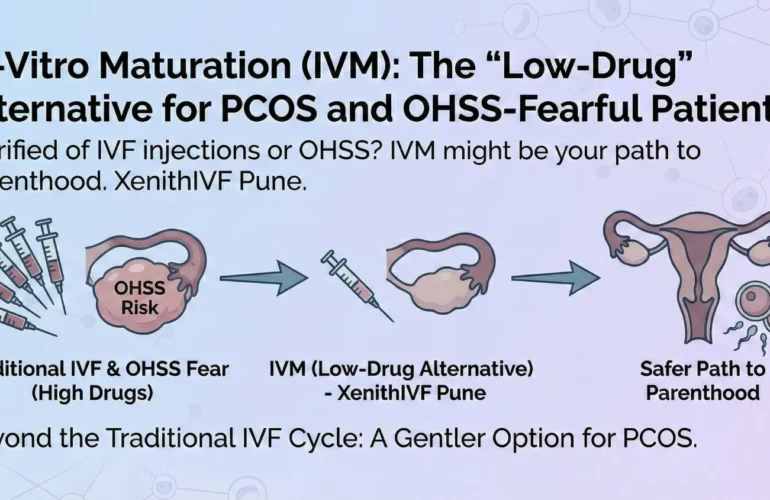Advanced Sperm Retrieval for Improved Fertility Outcomes
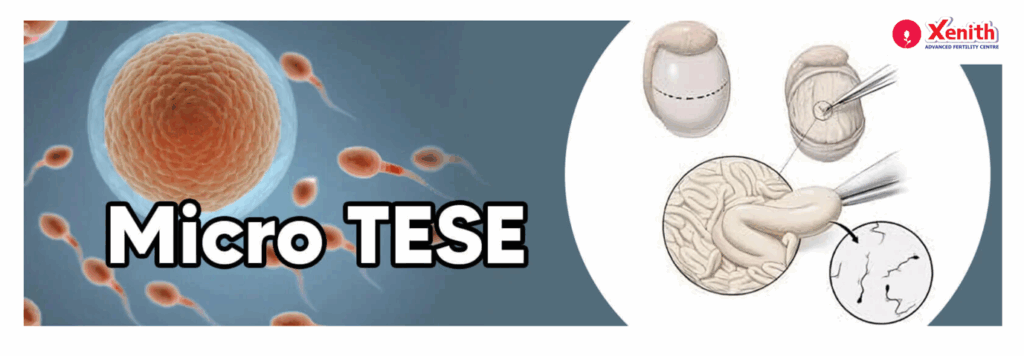
Male infertility can be a challenging road, but modern medicine continues to bring hope through innovative techniques like Micro-TESE (Microsurgical Testicular Sperm Extraction). This advanced surgical procedure provides new hope for men facing infertility—particularly those with little to no sperm production—to achieve fatherhood.
Ready to explore your fertility options?
Book a consultation with Xenith IVF Center today and take your first step toward parenthood.
Introduction to Micro-TESE
Micro-TESE is a cutting-edge surgical sperm retrieval procedure used in the treatment of male infertility, especially in cases where sperm production is extremely low or absent (a condition known as non-obstructive azoospermia). Unlike standard methods, Micro-TESE uses a high-powered surgical microscope to precisely locate areas in the testes most likely to contain sperm.

Free Thursday Consultation
Book Your AppointmentMen who may benefit from Micro-TESE include:
- Those diagnosed with non-obstructive azoospermia
- Men with genetic or hormonal causes of impaired sperm production
- Patients who’ve had unsuccessful prior sperm retrieval attempts
Xenith Hope Circle
Join our new WhatsApp community
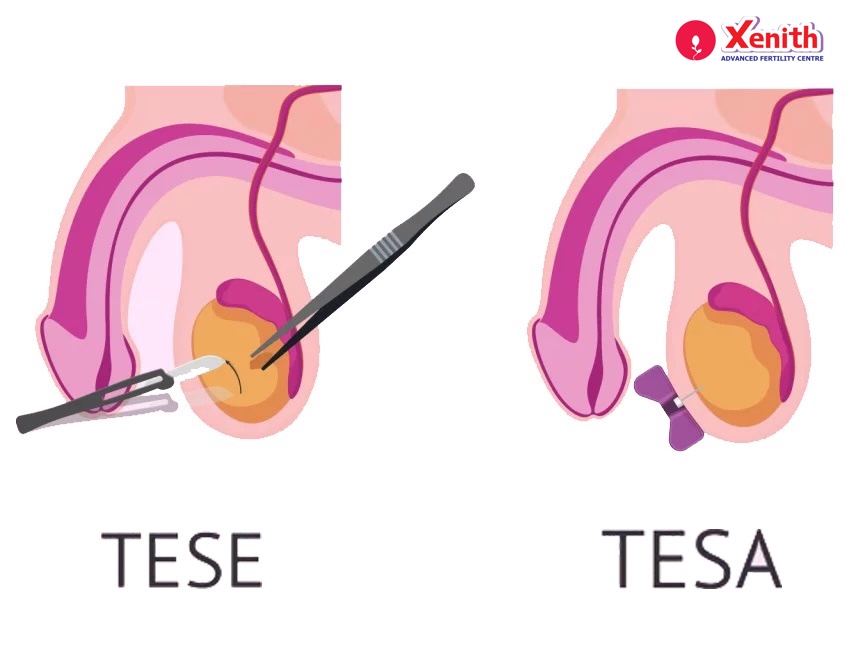
What Is Micro-TESE?
Micro-TESE involves the microsurgical extraction of sperm directly from the seminiferous tubules of the testicles. Using a powerful operating microscope, the surgeon identifies the most promising areas within the testes and extracts tissue in a highly targeted manner.
How It Differs from Other Methods:
- TESE (Testicular Sperm Extraction): A blind biopsy with lower precision
- TESA (Testicular Sperm Aspiration): Uses a needle to extract tissue, often with low yield
- PESA (Percutaneous Epididymal Sperm Aspiration): Used mainly for obstructive azoospermia
Micro-TESE stands out for its precision, minimal tissue damage, and higher sperm retrieval rates.
Who Needs Micro-TESE?
Micro-TESE is particularly beneficial for:
- Men with non-obstructive azoospermia (NOA): A condition where the testicles produce little or no sperm due to testicular failure
- Patients with failed previous sperm retrievals: Those who have undergone TESE or TESA with no success
- Men with genetic conditions: Such as Klinefelter syndrome or Y-chromosome microdeletions
- Cancer survivors: Especially those who’ve undergone chemotherapy or radiation therapy
A detailed evaluation by a fertility specialist can help determine if you are an ideal candidate.
Procedure: How Micro-TESE Works
Step-by-Step Overview:
- Anesthesia: The procedure is done under general anesthesia.
- Microsurgical Access: A small incision is made in the scrotum to expose the testicle.
- Microscopic Examination: Under high magnification, the surgeon examines the seminiferous tubules for areas that appear more likely to contain sperm.
- Tissue Extraction: Small pieces of tissue are removed for analysis.
- Sperm Identification: The sample is immediately examined under a microscope by embryologists to identify sperm.
- Cryopreservation: Viable sperm can be frozen for future use in IVF/ICSI procedures.
Recovery and Aftercare:
- Most men return to light activities within 2–3 days
- Mild discomfort, swelling, and bruising are common
- Full recovery typically takes 1–2 weeks
- Pain is usually well-managed with oral medication
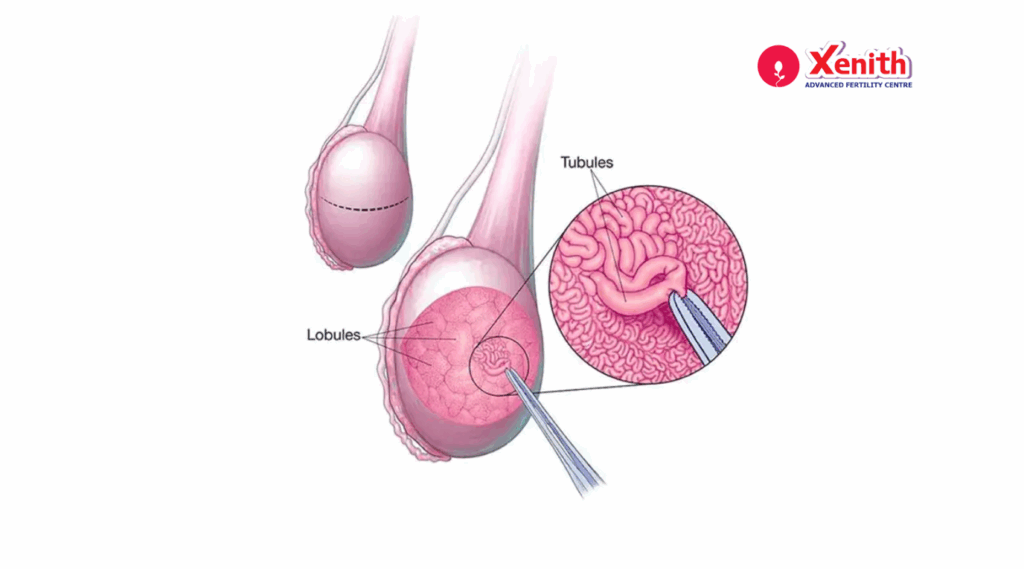
- Higher Sperm Retrieval Rates: Especially in NOA patients compared to conventional methods
- Minimal Damage: Reduced trauma to testicular tissue due to precise targeting
- Improved IVF/ICSI Outcomes: Retrieved sperm are often of better quality
- Single Procedure Efficiency: Often eliminates the need for multiple retrievals
- Psychological Relief: Offers hope to couples who had lost faith in fertility treatment
Risks and Considerations
While Micro-TESE is generally safe, it’s important to understand potential risks:
- Swelling, bruising, or infection
- Temporary testicular discomfort or pain
- Rare complications: Hematoma or damage to blood vessels
- Underlying cause of azoospermia
- Testicular size and hormone levels
- Surgeon’s experience and technology used
- Coordination with a skilled IVF lab
EXCELLENTTrustindex verifies that the original source of the review is Google. We highly recommend this clinic. Dr Mamta Mam Dr Poonam Mam Dr Pooja Mam are extremely humble and experienced doctors. Their overall staff was very kind ,polite and supportive. We are extremely happy with the treatment and positive report. Thank you so much Xenith IVF to make our dream come true.Posted onTrustindex verifies that the original source of the review is Google. We had a very positive experience at Xenith IVF & Fertility. From the first consultation itself, the doctors and staff made me feel heard, supported, and reassured during what can otherwise be an emotionally overwhelming journey. The doctors are extremely patient, knowledgeable, and take time to explain every step clearly without rushing. I really appreciated the transparency in treatment options and the calm way all doubts were addressed. It helped reduce a lot of anxiety. The nursing staff and coordinators are caring, approachable, and well-organised. Appointments were managed smoothly, and follow-ups were timely. The clinic is clean, hygienic, and well maintained, which added to the overall confidence and comfort. Most importantly, I felt treated not just as a case, but as a person. The empathy and emotional support made a huge difference. I would definitely recommend Xenith IVF & Fertility to anyone looking for professional, ethical, and compassionate fertility care.Posted onTrustindex verifies that the original source of the review is Google. Xenith IVF helped make our dream come true through IVF. I am most thankful to Dr. Mamta Dighe, along with Dr. Pooja, Dr. Reshma for their precise diagnosis, exceptional care and support throughout this process. The sisters Mayuri and Pallavi were kind and attentive. Reception team Kalyani, Samiksha and Sharayu were polite and welcoming thought I thought that at rush hours they need more helping hands to support them. Most of the time receptionist team is busy in peak hours and unnecessary wait may result in frustration. Rest all is very well organised, clean and neat.Posted onTrustindex verifies that the original source of the review is Google. Excellent ivf center. Highly recommended. Dr. Mamta is expert in her domain and consistently positive towards the treatment. Special thanks to her for personal attention to each and every detail. All the treatment process was managed with sincerity and transparency. The entire hospital staff is professional and polite. The reception and administrative staff efficiently handle all appointments and queries with great professionalism. Special thanks to Dr. Pooja for her regular guidance and timely support during emergency situations and for patiently addressing all concerns. Overall, the clinic is highly recommended and 100% trustworthyPosted onTrustindex verifies that the original source of the review is Google. I had a wonderful experience at Xenith IVF. The team took amazing care of us throughout the journey and made us feel supported at every step. Truly grateful and very happy with the experience.Posted onTrustindex verifies that the original source of the review is Google. Best doctor's ever, good experience, all staff are supporting.Posted onTrustindex verifies that the original source of the review is Google. Efficient and well-organized center. Friendly and understanding receptionists; amazing and phenomenal service of the doctors. It has truly been a wonderful experience. Thank you.Posted onTrustindex verifies that the original source of the review is Google. After a long journey, Xenith IVF helped make my dream come true through IVF. I am most thankful to Dr. Mamta Dighe, along with Dr. Pooja, Dr. Poonam, Dr. Reshma, and Dr. Minal, for their exceptional care and support throughout this process. The sisters Ms. Sonia, Ms. Mayuri, Ms. Pallavi were kind and attentive, and the reception team Ms. Kalyani, Ms. Samiksha, Ms. Sharayu was polite and welcoming. The clinic maintains state-of-the-art lab facilities with advanced technology and strict hygiene standards, which gave me confidence throughout the process. I also appreciate their complete transparency in procedures and clear communication at every step, which made the experience stress-free and trustworthy. The team ensures maximum patient comfort and provides emotional support during every stage, patiently answering questions and offering reassurance when needed. Xenith IVF is known for its high success rates and personalized treatment plans, which truly make a difference for couples struggling to conceive. Thank you, Xenith IVF, for your dedication and compassionate approach. I highly recommend Xenith IVF to anyone looking for expert care and a supportive team.Posted onTrustindex verifies that the original source of the review is Google. We extend our sincere appreciation for the exceptional service provided by Xeinth. The doctors, particularly Dr. Pooja, demonstrated remarkable expertise and knowledge, offering invaluable guidance and care throughout our experience. Her ability to address each query with clarity and compassion was greatly appreciated. The entire staff, including the nurses, exhibited a high level of professionalism and empathy, making our journey a positive one. Thank you team. We highly recommend Xeinth for their outstanding care and service.
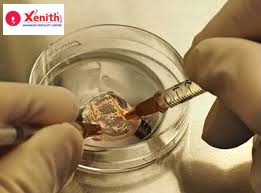
At Xenith IVF Center, we bring together clinical expertise, state-of-the-art technology, and a personalized approach to give you the best chance of success.
- Experienced Andrologists and Urologists: Highly skilled in microdissection techniques
- Advanced Microscopy Equipment: Allows for optimal visualization and sperm detection
- Integrated IVF Lab: Ensures seamless coordination for sperm analysis and use
- High Success Rates: Many of our patients go on to successful IVF/ICSI cycles
- Compassionate Care: We understand the emotional journey and support you at every step
Frequently Asked Questions
Success rates vary, but sperm is retrieved in approximately 40–60% of NOA cases at experienced centers like Xenith IVF.
The procedure is done under anesthesia. Mild discomfort may be felt after, manageable with medications.
Costs vary by region and facility but generally range between INR 1,00,000–1,50,000. It’s best to consult directly for a detailed estimate.
Men with non-obstructive azoospermia, failed prior retrieval attempts, or genetic causes of infertility are often ideal candidates.
Yes. Since Micro-TESE often retrieves better-quality sperm, it can enhance fertilization rates during ICSI and improve overall IVF outcomes.
Micro-TESE has revolutionized the treatment of male infertility, offering renewed hope to couples struggling with azoospermia. By using microsurgical precision, this technique maximizes sperm retrieval while minimizing testicular damage.
However, its success depends heavily on the skill of the surgical team and the support of a high-quality IVF lab. If you or your partner are exploring advanced fertility options, consulting with an experienced fertility specialist is the first and most important step.
Why Choose Xenith?
We have years of experience, expertise and the latest reproductive technologies in the area of infertility and treatment plan designed for individual needs. The staff at Xenith is highly trained in the latest embryological, medical and technological know-how as well as counselling and therapeutic communication. We are equipped to offer evidence-based treatment in infertility efficiently.
- Patient-centered care
- Specialty in Recurrent IVF Failures
- Focus on interventions
- High IVF success rates
- High Clinical Standard
- All treatments under one roof
Book Appointment Today!
Recent Posts
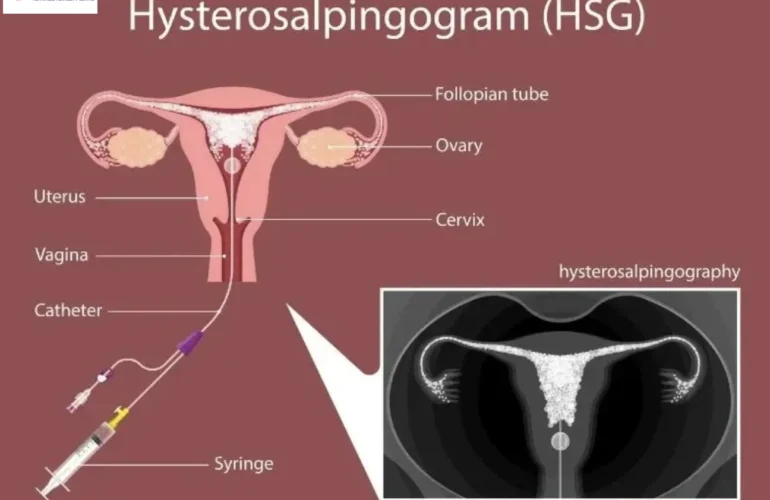
Is the HSG Test Painful? A Patient’s Step-by-Step Guide to Stress-Free Testing in Pune
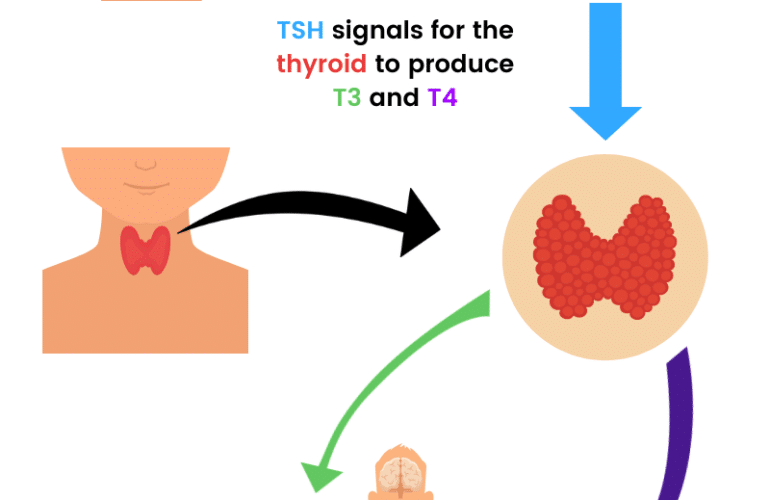
Autoimmune Thyroid Disease and Fertility: Diagnosis, Treatment, and IVF Success Strategies

Comprehensive Guide to Herbal Supplements for Fertility: Evidence, Dosage, and Safety
